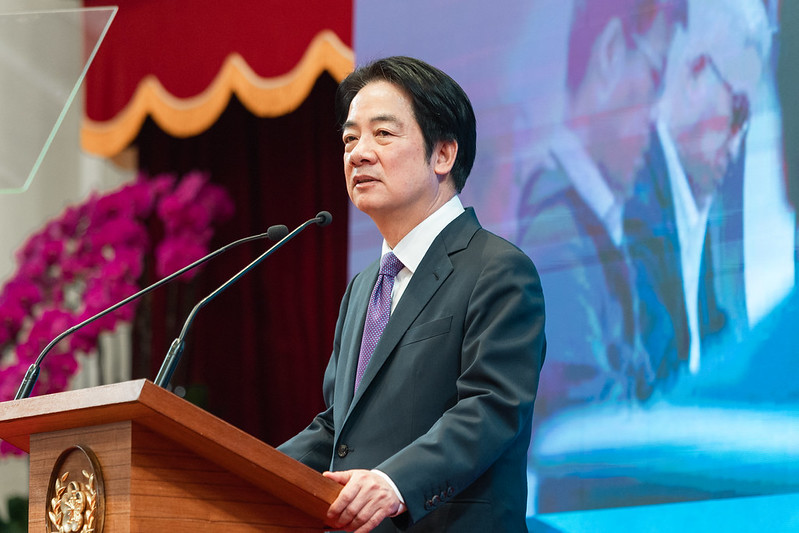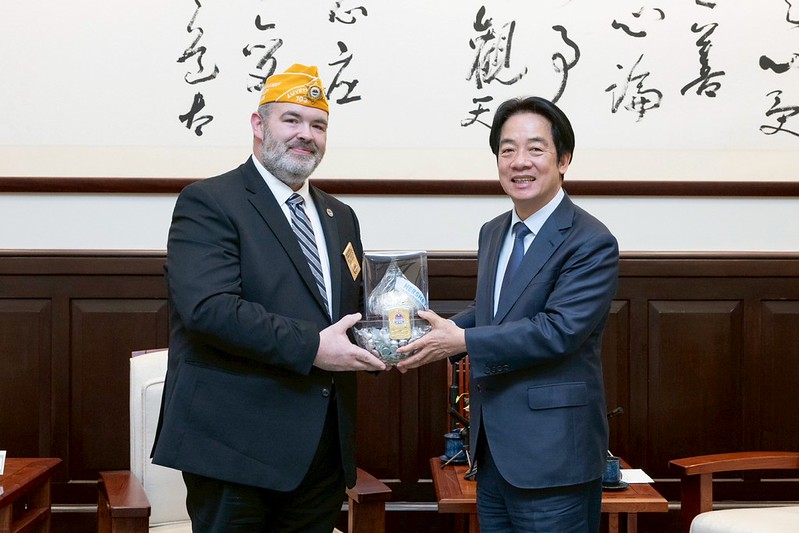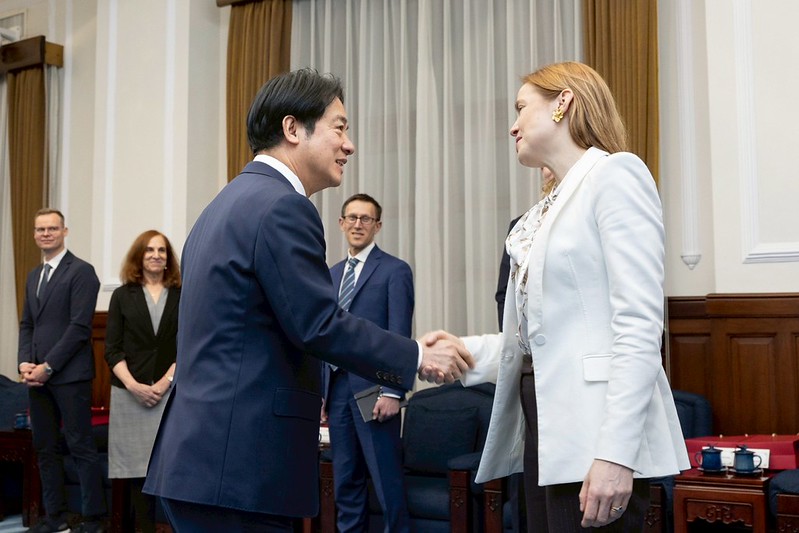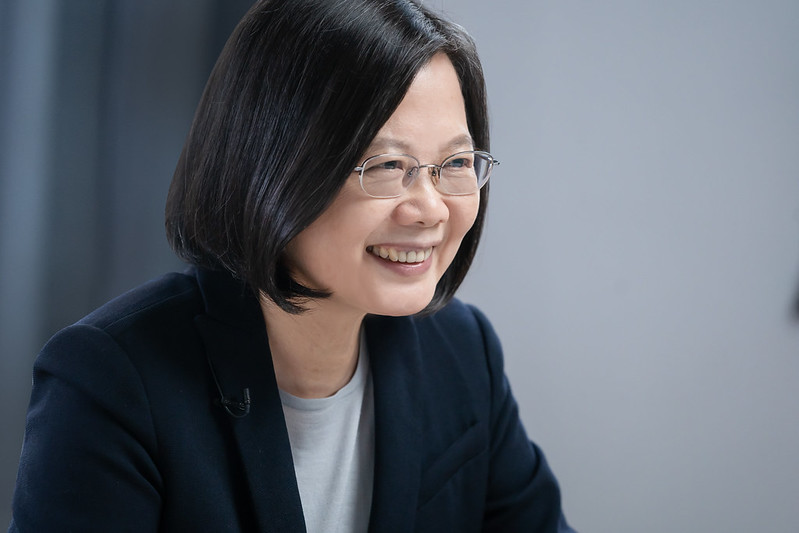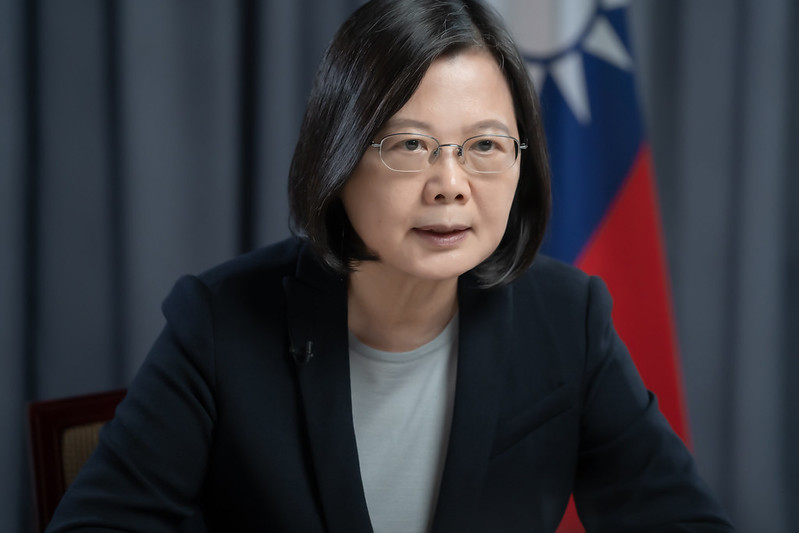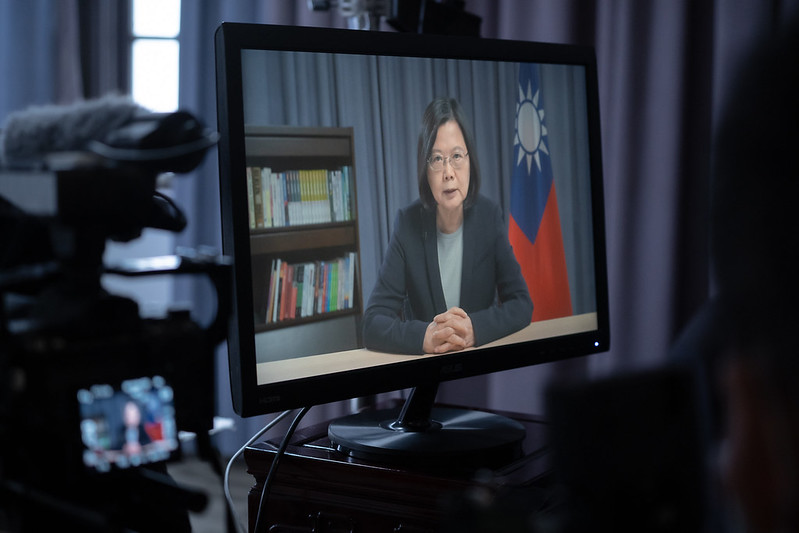News & activities
 News releases
News releases
President Tsai Ing-wen was invited by the Hudson Institute, a think tank based in Washington, DC, to deliver remarks at 8:00 a.m. this morning (December 10 local time; December 9, 7:00 p.m. US EST) at their virtual year-end celebration.
In her pre-recorded address, President Tsai said that Taiwan now stands on stronger footing after a year filled with challenges and opportunities. She said that the actions we have taken to strengthen our democracy, enhance our defense capabilities, and provide for greater economic security are aimed at better securing our future. President Tsai also emphasized that Taiwan is a powerful example of freedom, democracy, and free markets, which holds great significance for the Indo-Pacific region, and that she is fully committed to continuing progress in this direction.
A transcript of the president's remarks follows:
Dear friends, it is an honor to be speaking to the Hudson Institute's year-end celebration. This has been an extraordinary year – humanity has been faced with monumental challenges and incredible difficulties. But throughout it all, our faith in our future, in better days ahead, in the underlying goodness of our societies, this has never wavered. I know that we will emerge from the end of the tunnel stronger than before.
I want to thank President Weinstein, Mr. Walters, and your colleagues for holding this virtual gala. Hudson's dedication to advancing freedom, security, and prosperity both at home and abroad is well recognized and appreciated.
I am grateful that Hudson hosted me in August together with the Center for American Progress. You also welcomed Vice President William Lai during his visit to Washington, DC in February. Both of us appreciated the opportunities to exchange views on the regional situation that we face.
History has a tendency of repeating itself. It is becoming increasingly clear that today, the world is once again being faced with fundamental questions of freedom or authoritarianism. As we look at Hong Kong, we see what was one of Asia's most free and prosperous cities descend into fear, anxiety, and instability.
In the South China Sea, what was once an unfettered region critical to international maritime traffic has become highly militarized. In places such as Xinjiang, growing religious oppression has led to serious international concern. All of this is leading further and further away from the 21st century so many of us had once envisioned.
We are also watching with alarm the increasing provocation from across the Taiwan Strait. PLA fighter jets and naval ships now cross the median line of the strait with regularity, raising the risk of accidents and miscalculations.
The PRC has worked to shut the 23 million people of Taiwan out of international organizations, despite our legitimate requests to be included on matters of health, aviation safety, international police cooperation, climate change, and more. They are also engaged in disinformation and malign influence campaigns that are designed to cast doubt on our institutions and test weaknesses in our democracy.
I want to be clear: We do not desire this sort of cross-strait relationship. What we seek is constructive cross-strait dialogue, in order to peacefully address differences of opinion and perspective without the need for preconditions.
We see a necessity for both sides to find a way to co-exist peacefully, based on mutual respect, goodwill, and understanding. This has been the basis of my cross-strait policy, as it is a position that best serves the interests of peace and stability in the region.
While the 23 million people of Taiwan do not want to live in a state of permanent antagonism, we are also determined to safeguard our freedoms and way of life. We have made it a priority to strengthen our most valuable asset, that is democracy. We have implemented responsible ways to tackle disinformation through openness and transparency.
New legislation was passed to respond to PRC malign influence in our politics. Together with the U.S. and other international partners, we are also engaged on issues ranging from media literacy to accountable governance. These actions signal to all across the region about the resiliency of our democratic processes.
We have taken further actions to enshrine our principles of religious freedom and respect for human rights. We have inaugurated regional conferences on religious freedom, inviting faith leaders from around the region to participate.
Earlier this year, we also established our first-ever National Human Rights Commission to better monitor, secure, and strengthen human rights protections within Taiwan.
All of these actions are in line with our desire for Taiwan to shine brightly as a light of freedom in the region.
Taiwan is determined to take a different path forward. In order to do so, we must also be able to deter military adventurism and defend ourselves in the face of growing military tensions.
Over the past four years, I have acted on my commitments to increase our defense budget, erasing years of painful cutbacks. We expect that by next year, our regular defense spending will reach $14.9 billion US dollars, accounting for more than 2.2% of our GDP. I am determined to see this trend continue.
But more important than this, is to ensure that we are making investments in the right equipment and training. I appreciate the U.S. has made available new fighter jets, as well as new asymmetric capabilities, in line with our requests.
We are also devoting greater focus towards building up domestic defense industries. The security relationship is a highlight of our relationship, and I look forward to further discussions about our common defense picture with the U.S.
Another issue that is vital for us is our economy. As former Japanese Prime Minister Abe spoke about at this event seven years ago, few things are more essential than "restoring the economy."
For a long time, Taiwan's economy has remained stagnant. Wages failed to grow, and our global competitiveness continued to slip. As a consequence of this, talent and capital gradually left our shores for better opportunities abroad. Our trade became increasingly dependent on actors that may not have our best interests at heart.
I am pleased to say that this is no longer the case. As a result of the economic and regulatory reforms we have put into place, we have regained our leadership position amongst the Four Asian Tigers. We have continued to maintain positive economic momentum, despite the global downturn.
Meanwhile, our cutting-edge industries have become crucial to global supply chains, and we are welcoming record-numbers of inbound investment. As I have said in the past: "Economic security is national security." Today, we are better prepared than ever to respond to global challenges.
Taiwan continues to seek greater partnerships with other free-market economies around the world. Last month, we held our first Economic Prosperity Partnership Dialogue with the U.S., sharing ways we can enhance cooperation on supply chain security, 5G technologies, and global health.
Both sides will also move towards formalizing a new agreement on science and technology. But we believe that this relationship still has room to grow. As one article from Hudson states: "this is the right moment for a U.S.-Taiwan trade agreement." I could not have said it better myself, and we hope to engage in further discussions in this regard.
As we look back at a year full of challenges and opportunities, I am confident that Taiwan now stands on stronger footing. The actions we have taken to strengthen our democracy, to enhance our defense capabilities, and to provide for greater economic security – the purpose of this, is to better secure our future. Taiwan is an indispensable example of freedom, democracy, and free markets. This holds profound significance for the entire Indo-Pacific region, and I am determined to see this continue.
I have consistently believed that as President, my most sacred duty is to ensure that our next generation maintains their right to choose their own futures. Nothing can be more important.
And thanks to our friends in Congress, across different U.S. administrations, and here at Hudson, we know that we do not stand alone in this purpose. As we look around the globe, we find more and more recognition that our future is also related to the future of the free world – a world we all wish to see in the 21st century and beyond.
I wish to thank everyone for the honor of joining you tonight. The road to freedom and democracy is long and never easy. But it is one that is always worth taking. Thank you.
The Hudson Institute's virtual year-end celebration commenced at 6:30 p.m. on December 9 (US EST; 7:30 a.m., December 10 local time) and was focused on significant challenges the US and their allies face, and their responses. It was hosted by Hudson Institute Chief Operating Officer John Walters, with President and Chief Executive Officer Kenneth Weinstein introducing President Tsai. Other participants included Israeli Prime Minister Benjamin Netanyahu, US Senator Tom Cotton, US Congressman Seth Moulton and Congressional Chair of the House Republican Conference Liz Cheney.
The Hudson Institute is a key think tank based in Washington, DC. Its year-end celebration regularly hosts renowned political figures such as US Secretary of State Mike Pompeo, who attended last year's event and gave a notable speech entitled "The China Challenge." Previous guests have included former Japanese Prime Minister Shinzo Abe, US Vice President Mike Pence and Israeli Prime Minister Netanyahu, indicating the significance of this event.

